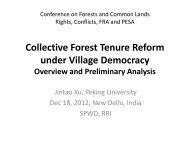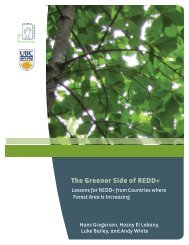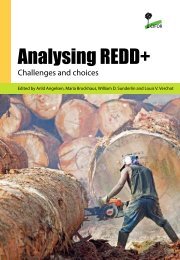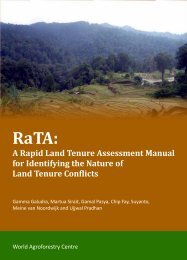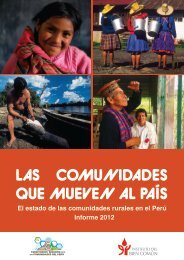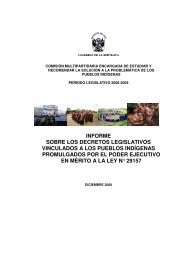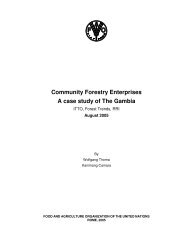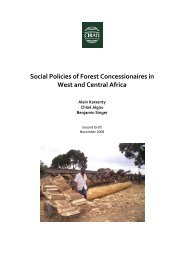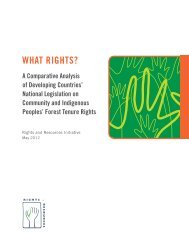An investigation into forest ownership and customary land ... - Fern
An investigation into forest ownership and customary land ... - Fern
An investigation into forest ownership and customary land ... - Fern
You also want an ePaper? Increase the reach of your titles
YUMPU automatically turns print PDFs into web optimized ePapers that Google loves.
Chapter 5 – So which way forward<br />
Clearest evidence of this logic at work is seen in frequently encountered intention<br />
to set aside the most precious <strong>forest</strong>l<strong>and</strong>s of community properties against any<br />
cultivation, to confine slash <strong>and</strong> burn to already once-cleared or degraded areas.<br />
This bodes well for <strong>forest</strong> conservation <strong>and</strong> for local retention of a resource<br />
of enormous value to future livelihoods. The <strong>forest</strong> need not disappear <strong>into</strong> a<br />
myriad of cleared l<strong>and</strong>s.<br />
The needed catalyst to this, FDA must have already seen in its offer of ground<br />
rent, is for owners to be formally recognised as the owners of the values of their<br />
l<strong>and</strong>.<br />
11. The challenges of achieving real change cannot be under-estimated<br />
No matter how obvious reforms in approaches are, the difficulty of realising them<br />
should not be underestimated. Delay in issue of new contracts is frustrating to<br />
both the business community <strong>and</strong> a revenue-poor administration. There were<br />
reasons over the last half century why rural Liberians lost rights to their l<strong>and</strong> <strong>and</strong><br />
these drivers remain. This is tangible in the ambitions of the private sector, often<br />
backed up by as ambitious international interests. Liberia would not be the first<br />
modern administration to simply find it ‘inconvenient’ to recognise local <strong>forest</strong><br />
<strong>ownership</strong>. It is also a fact that governments are generically not well disposed to<br />
surrender powers they have awarded themselves, at least not without popular<br />
pressure.<br />
257<br />
A more modern approach to economic development may help crystallise the<br />
benefits of reform. This has its roots in rising awareness that the choice is not,<br />
after all, between supporting the interests of people or the state, nor is it between<br />
meeting either the dem<strong>and</strong>s of social justice or economic growth. The challenge<br />
lies in a structural change to <strong>forest</strong> governance that integrates the two, enabling<br />
the sector to offer a genuine strategy of development with growth. Recognising<br />
communities as lawful owners of <strong>forest</strong>s <strong>and</strong> necessarily equal partners in all<br />
decisions <strong>and</strong> contracts as to how their properties are used is the route forward.<br />
12. State-people relations in the mining sector should not be ignored<br />
Finally, although not the subject of this study, implications for the mining sector<br />
need brief comment. The currently different legal position of mineral <strong>ownership</strong><br />
must be observed. National <strong>ownership</strong> of minerals has a long constitutional<br />
basis (1847). National <strong>ownership</strong> of <strong>forest</strong>s does not. The reason stems from the<br />
higher values of minerals, which governments much more routinely keep for<br />
themselves. It also has to be acknowledged that with the exception of surface<br />
gold <strong>and</strong> iron mining minerals have not featured prominently in rural life <strong>and</strong>



